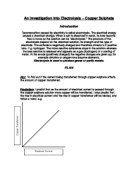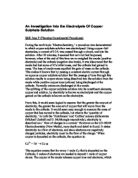Research:
I have researched other possible ways to work out a rough idea of what the results may be:
Charge (C) = Current (A) x Time (sec.)
- Moles of Electrons or Faradays = Charge (C) / 96500
- Moles of Copper = Moles of electrons or Faradays / ratio=2
- Mass = moles x RAM
- If the Current is 0.2A and the time taken 5 minutes
- Charge = 0.2 x (5x60)
- Faradays = 60/96500
- Moles of Copper = 0.0006217/2
- Mass = 0.0003108 x 64
- Mass = 0.0199 grams
- If the Current is 0.2A and the time taken 10 minutes
- Charge = 0.2 x (10 x 60)
- Faradays = 120/96500
- Moles Copper = 0.0012435/2
- Mass = 0.0006217 x 64
- Mass = 0.0398 grams
- If the current is 0.2A and the time taken 15 minutes
- Charge = 0.2 x (15 x 60)
- Faradays = 180/96500
- Moles Copper = 0.0018652/2
- Mass = 0.0009326 x 64
- Mass = 0.0597 grams
- If the current is 0.2A and the time taken 20 minutes
- Charge = 0.2 x (20 x 60)
- Faradays = 240/96500
- Moles Copper = 0.002487/2
- Mass = 0.0012435 x 64
- Mass = 0.0759 grams
- If the current is 0.2A and the time taken 25 minutes
- Charge = 0.2 x (25 x 60)
- Faradays = 300/96500
- Moles Copper = 0.0031088/2
- Mass = 0.0015544 x 64
- Mass = 0.0995 grams
Apparatus: Ammeter, power pack, 2x copper plates, copper sulphate, beaker, electrical wires, scales.
Measurements:
I am going to measure, by weighing, the weight of both the copper anode before and after each change in current. I will weigh the electrode to the nearest 100th of a gram to give me accurate results on which to base my conclusion. I am measuring the weight of one electrode only as I believe it would take to long, and would be a pointless exercise to weigh both. I would expect the weight of the anode to decrease with increased current. The change in mass of copper indicates reaction rate so that the more copper deposited at the cathode, the faster the reaction rate. I will need to ensure that the anode is washed, dried and re-weighed after each test to ensure a fair test.
Method:
- Set up the apparatus –
- Put copper sulphate solution into the beaker.
- Weigh the anodes original weight and make note of this.
- Clip the copper plates to the sides of the beaker, making sure they are in the copper sulphate solution.
- Connect the power pack and ammeter to the copper plates, creating a circuit.
- Adjust the ammeter to display the correct readings.
- Switch on the power pack and adjust the current.
- Leave the current to pass through the copper sulphate for 5 minutes and weight the anode, again making note of this.
- Repeat the last stage.
Safety: Copper sulphate is an irritant so I will be careful not to get it on my hands or eyes. Goggles will be worn to prevent it going in my eyes.
Fair test:
In order to carry out a fair test, the only variable to be changed will be the current (amount of electricity) passing through the copper sulphate solution.
The experiment carried out aimed to monitor the quantity of Copper (Cu) metal deposited during the electrolysis of Copper Sulphate solution (CuSo4) using Copper electrodes, when certain variables were changed. It was considered that the following factors could affect the deposition of Copper metal on the cathode.
1. Time
2. Current
3. Temperature
4. Concentration of Solution
5. Quantity of Solution
6. Size of Electrodes
7. Distance between the electrodes
8. The surface of the electrodes
I will ensure the following variables are kept constant:
- Concentration and amount of copper sulphate solution.
- Voltage.
- Time – Each test will run for 5 minutes.
- Temperature – The experiment will take place at room temperature.
Reliability: To ensure that the results are reliable and accurate I will perform the test at each temperature twice and take the average. I didn’t perform the test more that twice because it would have taken to long and I believe that performing the experiment twice will provide accurate and reliable results.
Obtaining Evidence
I used a wide range of equipment and materials to obtain the evidence required for this experiment. I managed their surrounding environment to ensure that I obtained accurate results.
I decided to conduct the obtaining of the evidence in the following way:
- Once the experiment had been set up correctly (see apparatus in the plan section) I made sure that all the equipment was working correctly. I did this by doing a “trail” experiment (see “trial” in “plan” section).
- I conducted the “true” experiment, and recorded measurements given.
- I repeated the “true” experiment again and recorded the second set of measurements for the anomalous results.
- I displayed the results in a table and a graph.
Results:
This was my only anomalous result; it was quite a small, the result should have been as below. I put both the anomalous result onto the graph.
(GRAPH)
Analysing & Considering Evidence
The results obtained support the prediction that the longer the current is left to flow, the more Copper metal is deposited on the cathode. It is now true to say that if the time is doubled the charge is doubled, and therefore the amount of copper produced. Proof of this can be seen in the obtained results.
Conclusion: I conclude that the results obtained support the prediction that the longer the current is left to flow, the more Copper metal is deposited on the cathode. It is now true to say that if the time is doubled the charge is doubled, and therefore the amount of copper produced.
The actual results produce an almost straight-line graph, showing that:
The mass of Copper is relative to the Time the current flows.
Therefore, it has now been proved, through this experiment, that both of Faraday’s Laws Of Electrolysis are correct.
Faraday’s First Law of electrolysis states that:
“The mass of any element deposited during electrolysis is directly proportional to the number of coulombs of electricity passed”
Faraday’s Second Law of electrolysis states that:
“The mass of an element deposited by one Faraday of electricity is equal to the atomic mass in grams of the element divided by the number of electrons required to discharge one ion of the element.”
It has also been discovered that the copper anode releases copper ions and electrons, which form copper at the cathode.
Evaluation
Although this was a successful experiment, there were some factors of the experiment, which could have been improved to make it even more successful. One of these factors could have been the electrodes, which, even after a good clean were still quite dirty and obviously still had irremovable substances from previous experiments still attached to them. If this experiment were to be repeated for a second time, in need of greater accuracy, it would be imperative to have a new pair of electrodes, which have never been used before.
Another factor which may have affected the overall outcome of the investigation may have been the fact that the practical work of the investigation was carried over from lesson to lesson, meaning that variables such as the concentration or the amount of the Copper Sulphate solution could have changed between lessons. To overcome this problem, a stock solution of Copper Sulphate should have been made so as the concentration remained the same at all times. The same electrodes and equipment should have been used throughout. Also, when weighing, the same electrical balance should have been used as there may have been slight differences between the two balances. This is what could explain the anomaly in the graph.







